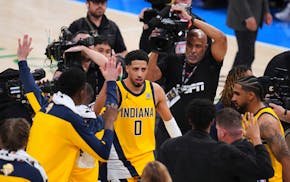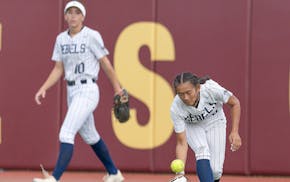Every home game, with 50 minutes remaining on the pregame countdown clock, about nine Timberwolves players will gather in the coaches' auxiliary locker room in a back hallway of Target Center.
They sit in chairs with their phones in hand — they need them to answer exam-like trivia questions over the next five to 10 minutes — as a member of the Wolves' player development staff runs through film clips of that night's opponent.
The players in attendance are the younger Wolves, players like Rob Dillingham, Terrence Shannon Jr., Jaylen Clark, Luka Garza, Josh Minott and others who bounce between the Wolves and the G League.
This is an extra film session the coaching staff has held most of the season. The goal is to help the younger players get a more in-depth look at their opponent, help them learn the specific tendencies of who they might be guarding, and educate them on styles of play and individual players.
"These guys, they cannot really afford the opportunity to come in and mess up a play, a defensive coverage, a concept," said assistant coach Nate Bubes, who, along with James White, came up with the idea of holding the extra sessions. "They need to come in and play their six, eight, whatever minutes it is, making sure that it's their talent that shows and that we don't remember them missing something that had been talked about."
Does a certain player like to drive right or left? What are his go-to moves if he's posting up? How do you handle certain players coming around screens? How far should you close out on a particular player if they have the ball at the three-point line? What is the opponent's overall offensive philosophy?
These issues and more are covered in this session, which has played a role in helping the rookies Dillingham, Shannon and Clark navigate their first major minutes in the league. Their more veteran teammates already know this stuff or can have it reinforced when the team holds its regular film session for that opponent.
But for the younger players, the more they can see what they are up against, the more the coaching staff feels they are likely to succeed when they get a chance at playing time.
"That's why this film session is important for us," Garza said. "Because those are things we can't mess up on if we get our name called to go out there."
How it started
Garza and Minott played an important role in the creation of this film session with how they attacked playoff preparation last season. Those who weren't in the rotation served as the scout team in practice throughout last season's playoffs. They would all play a particular role on the opponent; for instance, Garza was tasked with mimicking Nikola Jokic in the Denver series.
Bubes said both knew Denver inside and out during that series, to the point that Garza was yelling out plays the Nuggets were about to run and what players might be looking to do based on their tendencies.
"Luka could damn near be a coach," said Chris Hines, the Wolves' head of player development.
"Luka don't forget nothing," Shannon said. "He knows everything, every scout. He gonna know it all."
That got White thinking: How could the Wolves get their players to know their opponents better during the season? The playoffs, with so much time to prepare for one opponent, make it easier to know someone else's playbook. How could the Wolves help their young players do this in a busy season where another game is always around the corner and the team is short on practice time? That's where he and staff devised the idea for the film sessions.
"Every little thing helps them," White said. "It could be the smallest thing, just the smallest detail can help you out on the floor. It's really showing dividends, especially with a guy like Jaylen Clark. He always comes to the bench and asking things like, 'This guy wants to go what way?' "
How it works
The staff divides the sessions by opponent, with many helping lead them throughout the season. This not only helps the players, but it also helps the coaches find their voice in settings like these as they look to advance in their careers.
"Everybody gets a turn and a chance," Bubes said.
Bubes didn't want these sessions to feel like punishment or extra work, so he devised a way to keep the players engaged: They would answer questions on the quiz software Kahoot, and the players would compete against each other to see who could answer the most questions and in the shortest amount of time. The coaches stop the film when they want to ask a question, and Kahoot keeps standings of how each player does.
"It'll ask, like, 'What are we doing on four and five pick and roll?' " Garza said. "You have to know that. Or, if [a certain player] has the ball, which way does he want to go? If he's a primarily right-hand driver, you want to force him to the left hand. Stuff like that."
Garza and Minott are the kings of the quizzes. It got to the point that earlier in the season, Garza ran one of the film sessions when the Wolves played Portland for the third time in a week.
"Them two always fighting for first place," Clark said. "... It also goes on how fast you answer it. So you can get them all right, but if they get them right faster. …
"Maybe they're in cahoots," Nickeil Alexander-Walker said from his locker as Clark was talking.
Said Shannon: "If I lose [at Kahoot], I'm mad. Because I don't like losing at nothing. I don't care if it's Connect Four, I'm gonna try to win it. But it's competitive to me, I like it."
Their impact
On the road, the film session will be held earlier in the day, usually right when the players get off the bus. The sessions last 10 minutes tops — they can't be too long because everyone is trying to prepare for games and you don't want the players to get bored. But they served their purpose. As injuries forced coach Chris Finch to go deep into his bench, the rookies didn't make many gameplan mistakes on defense.
"I know who this is. This is what they like to do, and this what we're taking away from them," Clark said. "... The NBA is a lot about rhythm. A lot of guys like getting their shots where they get their shots. Subbing is somewhat rhythmic for most teams' play calling, like everything. So just to be able to disrupt certain individuals' rhythms, I feel like is what helps us."
There's only so much coaches and teammates can do from the bench to tell the players on the floor what's coming. Their instincts have to be tuned to what's happening. Watching the extra film has helped tune them in the right direction.
"For this stuff, if one thing sticks, we affected something," Bubes said.

Podcast: How the Pacers taught the Thunder (and the Wolves) a playoff lesson

Softball state tournament: Live updates from championship games at Jane Sage Cowles Stadium
Yuen: How success has pushed Minnesotans off sidelines in trans athlete debate
David Festa's return to Twins goes south in a hurry
